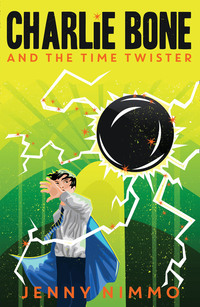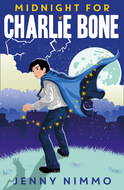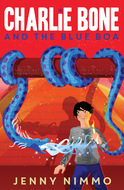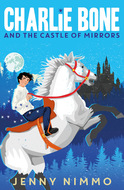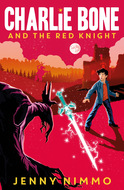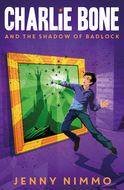Loe raamatut: «Charlie Bone and the Time Twister»
Books by Jenny Nimmo


For Ianto, who likes to travel, with love.
First published in Great Britain 2003 by Egmont UK Limited
This edition published 2010
by Egmont UK Limited
239 Kensington High Street
London W8 6SA
Text copyright © 2003 Jenny Nimmo
The moral rights of the author have been asserted
ISBN 978 1 4052 2544 1
eBook ISBN 978 1 7803 1203 3
10
A CIP catalogue record for this title is available from the British Library
Printed and bound in Great Britain by the CPI Group
All rights reserved. No part of this publication may be reproduced, stored in a retrieval system, or transmitted, in any form or by any means, electronic, mechanical, photocopying, recording or otherwise, without the prior permission of the publisher and copyright owner.

Egmont is passionate about helping to preserve the world’s remaining ancient forests. We only use paper from legal and sustainable forest sources, so we know where every single tree comes from that goes into every paper that makes up every book.
This book is made from paper certified by the Forestry Stewardship Council (FSC), an organisation dedicated to promoting responsible management of forest resources. For more information on the FSC, please visit www.fsc.org. To learn more about Egmont’s sustainable paper policy, please visit www.egmont.co.uk/ethical.
Contents
Cover
Books by Jenny Nimmo
Title page
Copyright
The endowed
1 A game of marbles
2 Grandma slams a door
3 A tree falls
4 Hiding Henry
5 Olivia makes a mess
6 Into the freezer
7 The black glove
8 You can’t go back!
9 Thunder House
10 Skarpo the sorcerer
11 The Pets’ Café
12 ‘Take him to the dungeons!’
13 Ezekiel’s visitors
14 Run over!
15 The tollroc
16 The wand
17 Tancred and the tree
18 Ambushed!
19 The Time Twister
20 A journey to the sea
21 Paton has a party

The endowed
The endowed are all descended from the ten children of the Red King; a magician-king who left Africa in the twelfth century, accompanied by three leopards.
The Red King had already lived for several centuries and he made a marvellous glass sphere, putting into it memories of his life and travels through the world. He used the sphere to twist through time, visiting the past and the future.
In any other hands, the Time Twister is dangerous and unpredictable.
The children of the Red King, called the Endowed.
| Manfred Bloor | Head boy of Bloor’s Academy. A hypnotiser. He is descended from Borlath, eldest son of the Red King. Borlath was a brutal and sadistic tyrant. |
| Asa Pike | A were-beast. He is descended from a tribe who lived in the Northern forests and kept strange beasts. Asa can change shape at dusk. |
| Billy Raven | Billy can communicate with animals. One of his ancestors conversed with ravens that sat on a gibbet where dead men hung. For this talent he was banished from his village. |
| Zelda Dobinski | Descended from a long line of Polish magicians. Zelda is telekenetic. She can move objects with her mind. |
| Beth Strong | Beth is also telekenetic. She comes from a family of circus performers. |
| Lysander Sage | Descended from an African wise man. He can call up his spirit ancestors. |
| Tancred Torsson | A storm-bringer. His Scandinavian ancestor was named after the thunder god, Thor. Tancred can bring rain, wind, thunder and lightning. |
| Gabriel Silk | Gabriel can feel scenes and emotions through the clothes of others. He comes from a line of psychics. |
| Emma Tolly | Emma can fly. Her surname derives from the Spanish swordsman from Toledo, whose daughter married the Red King. He is therefore an ancestor to all the endowed children. |
| Charlie Bone | Charlie can hear the voices of people in photographs and paintings. He is descended from the Yewbeams, a family with many magical endowments. |
| Bindi and Dorcas | Two endowed girls whose gifts are, as yet, undeveloped. |
A game of marbles
It was January 1916. The coldest winter in living memory.
The dark rooms in Bloor’s Academy were almost as cold as the streets outside. Henry Yewbeam, hurrying down one of the icy passages, began to hum to himself. The humming cheered him up. It warmed his spirits as well as his feet.
On either side of the passage the eerie blue flames of gaslights flickered and hissed in their iron brackets. The smell was horrible. Henry wouldn’t have been surprised to find something dead in one of the dark corners.
At home, in a sunny house by the sea, his sister, Daphne, was very ill with diphtheria. To avoid infection Henry and his brother, James, had been sent to stay with their mother’s brother, Sir Gideon Bloor.
Sir Gideon wasn’t the sort of person you would choose to spend your holidays with. There was nothing remotely fatherly about him. He was the headmaster of an ancient school and he never let anyone forget it.
Bloor’s Academy had been in Sir Gideon’s family for hundreds of years. It was a school for children gifted in music, drama and art. Bloor’s also took children who were endowed in other, very strange, ways. Just thinking about them made Henry shudder.
He had reached his cousin Zeke’s room. Zeke was Sir Gideon’s only child and a more unpleasant cousin Henry couldn’t imagine. Zeke was one of the endowed children, but Henry guessed that Zeke’s gift was probably nasty.
Henry opened the door and peeped inside. A row of glass jars stood on the windowsill. Inside the jars, strange things writhed gently in a clear liquid. Henry was sure it couldn’t be water. The things were pale and shapeless. One was blue.
‘What do you think you are doing?’
Aunt Gudrun came marching down the passage, her long black skirt drowning her footfalls with a sinister hiss. She was a very tall woman with a great amount of yellow hair piled into a bun on the back of her head. A real Viking of a person (she was, in fact, Norwegian), with an enormous chest and lungs to match.
Henry said, ‘Erm . . .’
‘Erm is not good enough, Henry Yewbeam. You were spying in my Zeke’s room, were you not?’
‘No, not at all,’ said Henry.
‘You shouldn’t be lurking in passages, boy. Come down to the sitting room.’ Lady Bloor beckoned with her little finger, and Henry had no choice but to follow her.
His aunt led him back past the mysterious locked doors that, only a few moments ago, Henry had been vainly trying to open. He was an inquisitive boy and easily bored. A huge sigh escaped him as he trundled down a creaking staircase to the first floor.
The Bloor family lived in the west wing of the academy, but they only occupied the rooms above the ground floor, which was almost entirely taken up by a draughty grand hall, a chapel and several assembly halls and classrooms. Henry had already explored some of these rooms and found them very disappointing. All they contained were rows of battered desks and chairs, and shelves of dusty-looking books.
‘Here we are!’ Lady Bloor opened a door and thrust Henry into the room beyond.
A small boy, who had been kneeling in the window seat, leapt down and rushed across to Henry. ‘Where’ve you been?’ he cried.
‘Just exploring,’ said Henry.
‘I thought you’d gone home.’
‘Home is miles and miles away, Jamie.’ Henry plonked himself in a deep leather chair beside the fire. The logs in the big iron grate smouldered with strange images. When Henry half-closed his eyes he could almost see the cosy sitting-room at home. He sighed again.
Aunt Gudrun frowned at Henry and said, ‘Behave yourselves, boys.’ She went out closing the door behind her.
When she had gone James came and sat on the arm of Henry’s chair. ‘Zeke’s been doing funny things,’ he whispered.
Henry hadn’t noticed Zeke, but now he became aware of his strange cousin, enclosed in a gloomy silence at the other end of the room. He was sitting at a table, absorbed in something laid out before him. His pale, bony face was frozen in an attitude of intense concentration. Not a muscle twitched, not a breath escaped him.
‘I was scared,’ James said quietly.
‘Why? What did he do?’ Henry asked in a hushed voice.
‘Well, he was doing a puzzle. There were pieces all over the table. Then Zeke stared at them and they all crawled together. Well, most of them. They made a picture. He showed it to me. It was a ship, but some of the pieces wouldn’t fit.’
‘It’s rude to whisper,’ said Zeke without taking his eyes off the puzzle.
Henry pulled himself out of the chair and strolled over to his cousin. He glanced at the twelve pieces lying beside the puzzle and then at the picture of the ship. It took less than a minute for him to see exactly where each piece fitted.
‘Hm,’ said Henry, and without another word he picked up the single pieces, one by one, and deftly placed them into the picture; two in the sky, three in the ship’s hull, two in the rigging and four in the sea.
For a moment, Zeke watched Henry’s hands in fascination. It was only when Henry was putting the last piece in place, that Zeke suddenly leapt up, crying, ‘Who asked you? I could have done it. I could!’
‘Sorry,’ said Henry, stepping back. ‘I thought you wanted some help.’
‘Henry’s good at puzzles,’ said James.
‘Well I’m good at other things,’ snarled Zeke.
James was too small to see the danger signs. The angry glitter in Zeke’s black eyes went straight over his head. ‘Magic doesn’t always work,’ the little boy said blithely. ‘Henry’s cleverer than you are, Zeke.’
With that remark poor James Yewbeam sealed his brother’s fate and, of course, his own.
‘Get out!’ cried Zeke. ‘Both of you. Hateful Yewbeams. Go, now. I can’t stand the sight of you!’
Henry and James ran for the door. There was a violent gleam in their cousin’s pale face, and they didn’t want to wait around for him to do something nasty.
‘Where are we going?’ panted James as he tore down the passages after his brother.
‘We’ll go to the big hall, Jamie. We can play marbles there.’ Henry pulled a small leather bag out of his pocket and waved it at his brother.
It wasn’t to be. Before they could go any further there was a shout from Aunt Gudrun.
‘James, bedtime.’ James pretended not to hear her. ‘Now, this minute.’
‘Better go,’ said Henry gently. ‘She’ll punish you, if you don’t.’
‘But I want to play marbles,’ said James.
Henry shook his head. ‘Sorry, Jamie. Not now. Tomorrow. But I’ll come and read to you later.’
‘Promise? Will you finish the story of the Wallypug?’
‘James, come here,’ shouted Aunt Gudrun.
‘I promise,’ said Henry, and he meant to keep his promise. But Zeke had other plans for him.
Hanging his head, James trailed back towards the tall figure at the end of the passage.
‘And you, Henry!’ called Aunt Gudrun. ‘You keep out of trouble.’
‘Yes, Aunt,’ said Henry.
He was about to descend the rather grand staircase down to the hall when he had an idea. It was already so chilly he could see his own breath, billowing away from him in little grey clouds. The great hall would be even colder. He might freeze to death.
Henry retraced his steps until he found the door to a room he had already investigated. It was a huge storeroom, full of clothes left behind by past students of the academy. There were rows of coloured capes: blue, green and purple; shelves of hats and suits, and boxes of ancient leather boots.
Henry selected a warm blue cape and put it on. It reached well over his knees, a perfect length for a draughty hall. He would be able to kneel on it without feeling the cold stone floor.
Henry descended into the hall. His hoard of marbles was the envy of all his friends. Henry’s father travelled extensively and never came home without at least one precious new marble for his son’s collection. Henry’s leather bag held onyx stones, polished agate, glass, limestone, quartz and even spheres of painted china.
There were no lights in the hall but an early moon sparkled through the long, frosted windows, giving the grey flagstones a soft pearly glow.
Henry decided to play Ring Taw, his favourite game. Deprived of an opponent, he would try to improve his skill by playing alone. With a piece of chalk, kept handy in his pocket, Henry drew a large ring in the centre of the hall. He then chalked a smaller ring inside the first. Selecting thirteen marbles from his bag, he placed them in a cross inside the smaller circle.
Now Henry had to kneel on the icy floor, just outside the large ring. Already his hands were blue with cold and he could hardly stop his teeth from rattling. Tucking the blue cape under his knees, he took out his favourite marble; it was a clear blue with a silvery glint inside it, like starlight. This was always his taw, or shooter.
Placing the knuckles of his right hand, palm outwards, on the floor, Henry put the blue taw on the tip of his first finger and flicked it with his thumb towards the marble cross. With a sharp clink it hit an orange marble right out of the two circles.
‘Bravo!’ Henry shouted.
There was a light creak from behind him. Henry squinted into the deep shadows on the oak-panelled walls. Was he imagining it, or did a long tapestry shiver slightly? On the other side of the tapestry a small door led into the west wing. Henry preferred the main staircase, for the passage behind the door was dark and creepy.
A cold draught swept past his knees and the tapestry billowed again. A flurry of hailstones clattered against the windows, and the wind gave a sudden moan as it rushed round the snowy courtyard.
‘Wind.’ Henry shivered and drew his cape closer. For good measure he even pulled the hood over his head.
In the passage behind the tapestry, Ezekiel Bloor stood with a lantern in one hand, and in the other – a glowing glass sphere. Dazzling colours swirled out of the glass; a rainbow laced with gold and silver; sunshine and moonlight, one after the other. Zeke knew he mustn’t look at them. He held one of the oldest marbles in the world.
On her deathbed, Zeke’s great-aunt Beatrice, a witch if ever there was one, had pressed the marble into his hand. ‘The Time Twister,’ she said in her cracked, dying voice. ‘For journeys through time. Do not look on it, Ezekiel, unless you want to travel.’
Ezekiel didn’t want to travel. He thrived in the great gloomy building that was his home and could seldom be persuaded to leave it. However, he longed to know what would happen if someone did look into the Time Twister. No one, in Zeke’s opinion, was more deserving of a shove through time, than his wretched cousin Henry Yewbeam.
Henry had by now knocked another three marbles out of the small chalked ring. He hadn’t missed once, in spite of his freezing fingers. He was just stepping back to his place outside the circle when a glass ball came rolling towards him. It was slightly larger than Henry’s blue taw, and tiny points of coloured light danced and shimmered all around it.
‘Oh, my,’ breathed Henry. He stood where he was while the strange marble rolled on until it reached his foot.
Henry picked it up. He gazed into the bright depths within the glass. He saw domes of gold, cities in sunlight, cloudless skies and much, much more. But even as he watched the scenes taking place before his eyes, Henry became aware that a change was taking place within his body, and he knew that he shouldn’t have looked upon those unbelievable and breathtaking scenes.
The oak-panelled walls were breaking up. The frosted moonlight was fading. Henry’s head whirled and his feet began to float. Far, far away, a cat began to mew. And then another cat, and another.
Henry thought of his small brother. Would there be time to reach him before he faded away completely? And if he did, and James saw a brother disappearing before his eyes, might he not be so frightened he would have nightmares forever? Henry decided to leave a message.
While he still had the strength, he took the chalk from his pocket and with his left hand (the right was still clamped round the Time Twister), he wrote on the stone floor, ‘SORRY, JAMES. THE MARBLES . . .’
It was all Henry had time for. The next moment he had left the year of his eleventh birthday and was travelling forward, very fast, to a year when most of the people he knew would be dead.
In a small, chilly room at the top of the west wing, James waited for his brother. He was so cold he had put his coat on over his flannel nightshirt. On the table beside him the flame from his candle, quivered in a draught from the door. Where was Henry? Why was he taking so long?
James rubbed his eyes. He was very tired but too cold to sleep. He drew the bedcovers up to his chin and listened to the patter of freezing sleet against the windowpane. And then his candle went out.
James sat rigid in his bed, too frightened to call out. Aunt Gudrun would be cross and Cousin Zeke would tease him for being a baby. Only Henry would understand.
‘Henry! Henry, where are you?’ James closed his eyes and sobbed into his pillow.
Before he had completely run out of tears, James stopped shivering. The room was getting warmer. He opened his eyes and found that he could see his pillow, his hand, the window. A soft glow had spread across the ceiling. When James looked to see where it was coming from, he was amazed to find that three cats were silently pacing round his bed. One was orange, another yellow and the third a bright coppery colour.
As soon as the cats knew they had been observed, they jumped up and rubbed their heads against the boy’s cold hands, his neck and his cheek. Their gleaming fur was as warm as sunlight, and as James stroked them, his fear began to leave him. He decided to go and look for Henry. Hardly had this thought entered his head than the cats leapt off the bed and ran to the door. They waited, mewing anxiously, as James pulled on his socks and his small leather boots.
With light sparkling on their silver whiskers and bright fur-tips, the cats led the way down the dark passages and narrow steps, while James hurried after them. At last he came to the wide staircase leading down into the hall. Here the cats’ worried mewing became loud and urgent, and James hesitated before he descended into the vast moonlit room.
Henry was not there. His marbles lay scattered on the stone floor, winking in the bright frosted light from the windows. As James moved slowly down the stairs, the cats ran before him, wailing and growling.
James reached the bottom step and walked to the chalked circle. He could see that Henry had been playing Ring Taw, his favourite game.
‘Henry!’ James called. ‘Henry, where have you gone?’
Never had a place appeared so vast and empty to small James Yewbeam. Never had his brother’s absence seemed so utterly complete. He wouldn’t try to call again. It was quite clear that Henry was gone. And he hadn’t even said goodbye.
Before the tears could fall again, the three cats pounced into the white circle, drawing the boy’s attention to four words chalked on the floor. A message? If only James could read. Henry had been patiently trying to teach him for weeks but, so far, James hadn’t managed a single word.
Perhaps he hadn’t really tried. Now, when it was a serious matter . . .
‘S . . . s . . . s . . .’ murmured James as the cats paced along the row of letters.
Next came an ‘o’ and then two ‘r’s, and further on his own name. And all at once James found he could understand the words his brother had left for him.
‘SORRY, JAMES,’ he read, ‘THE MARBLES . . .’ There the message ended.
Obviously Henry wanted his brother to keep the marbles safe for him. James picked up the leather bag but before he could reach the blue taw, the orange cat tapped it playfully and it sped across the hall. The yellow cat raced after it while the copper cat swept another three marbles out of the ring.
Now the great hall was alive with the sound of clinking glass and joyful purring. James was surrounded by dancing, glistening spheres of colour. The cats were playing a game and, as he watched them, a big smile broke over the boy’s face.
‘Stay with me,’ James begged the cats.
The cats would stay. For as long as he was in that cold, dreary building, they would keep James Yewbeam as warm and safe as any small boy had a right to expect.
Tasuta katkend on lõppenud.
